2019 年辽宁普通高中会考英语真题及答案
第一部分 阅读理解(共两节;满分 40 分)
第一节 (共 15 小题;每小题 2 分,满分 30 分)
A
Free Online Courses
Reading in the Digital Age
This course is for people from all walks of life who enjoy reading and would
like to know how literary scholars understand texts in the digital age.
It
introduces you to a variety of ways of understanding texts. Through the
course,
you will become familiar with professional reading practices as well as newer,
computer-driven reading skills.
Duration: 6 weeks
4 hours pw
2 August
Exploring English: Shakespeare
This course is aimed at high school students and university students who wish
to learn more about Shakespeare. The first week will look at Shakespeare’s life
and times. For the rest of the course, we will look closely at a different play
each week. Shakespearean actors will help us explore the universal themes in Romeo
and Juliet, Hamlet, The Tempest and Macbeth. Our video tutor (辅导员) will guide
you through the course and look at the words and phrases that Shakespeare introduced
to the English language.
Duration: 6 weeks
2 hours pw
16 July
The European Discovery of China
This course is aimed at anyone with an interest in Chinese, European or world
history. It focuses on when and how the West first approached China. We will look
at China’s place in the world and connections to the West via the Silk Road, the
rise of Genghis Khan and the Mongol Empire, and finally the Ming dynasty. We’
ll know this period of Chinese history through the eyes of Western travellers from
�
the 13th to the 17th century. What these Western travellers saw, what they didn’
t see — that’s the story that we will uncover in this course.
Duration: 8 weeks
6 hours pw
6 July
1. When you take Reading in the Digital Age, you will ________.
A. walk into different people’s life
B. learn ways of understanding
texts
C. get better at computer skills
D. share opinions with literary
scholars
2. Who will help students better understand the themes of Shakespeare’s plays?
A. Actors.
B. Scholars.
C. Historians.
D.
Video tutors.
3. What can people learn from The European Discovery of China?
A. Chin a’s discovery of the West.
B. The rise and fall of the
Qing Dynasty.
C. The importance of the Silk Road.
D. China’s interest in Western
travellers.
4. What are the subjects of these online courses?
A. Science and history.
B. Media and health.
C. Nature and environment.
D. Language and culture.
5. In which way do the three courses have in common?
A. They are aimed at students.
B. They are provided for free.
C. Each lasts 6 weeks.
D. Each takes 2 hours per week.
B
When you are sitting in class, have you ever drawn pictures in the margins (页
边的空 白处) of your notebooks? If so, you are doodling. Many people think of
doodling as a distraction (分心) from more important things. But it might be just
the opposite.
�
One study shows that doodling may help you remember things you hear 29% more.
Besides, doodling can help you think creatively. Walking away from a problem to
draw might actually help you solve it. When you co me back, you’ll have a fresh
perspective and figure out an answer more quickly.
An author named Sunni Brown wrote a book on doodling. She argues that doodling
is a tool that can help people think. In fact, she runs a business that helps
companies improve organization and planning through doodling. Brown believes
doodling is helpful because it includes many ways of learning. You learn in four
ways: seeing, hearing, reading or writing, and through movement. The more ways you
use, the better you learn. And when you doodle while listening to a lecture, you
use all four.
You might think that being good at drawing is important for doodling. But if
the point of doodling is to help you think, then it doesn’t matter what the picture
looks like. Even if you’re not an artist, doodling can help you. So next time you
need help focusing, pick up a pen and doodle away!
6. The passage mainly tells us the ________ of doodling.
A. advantages
B. disadvantages
C. effects
D. problems
7. What does the underlined word “perspective” probably mean in Paragraph 2?
A. 体验
B. 观点
C. 困扰
D. 机会
8. How does Sunni Brown feel about doodling?
A. It helps remember better.
B.
It
helps
think
creatively.
C. It involves four ways of learning.
D. It needs drawing skills.
9. According to the text, it is helpful to doodle when ________.
A. you want to focus your attention.
B. you have a conversation.
C. you wonder in the park.
D. you watch a movie.
10. Where is the passage possibly taken from?
A. A book review.
B. A message board.
�
C. A student textbook.
D. A science magazine.
�
C
MysummerholswrCWOT.B4,WEUSED2go2NY2Cmybro,hisGF&thr3:-@KIDS
FTF. ILNY, its gr8.
Can you understand this sentence? If you can’t, don’t feel too bad: neither
could the middle school teacher in England who received this as homework. This is
Netspeak: the language of computerized communication found on the Internet or
cellphones. To newcomers, it can look like a completely foreign language.
School teachers and parents say this new form of writing is harming (破坏) the
English language. Increasing spelling and grammatical mistakes can be seen in
students’ writ ing. They fear the language could become corrupted (面目全非的).
Everyone should just relax, say linguists (语言学家). They believe Netspeak
is in fact more of a good thing. David Crystal, from the University of Wales, argues
that Netspeak and Internet create a new language use and the almost lost art of
diary writing has been picked up again. Geoffrey Nurnberg, from Stanford University,
agrees. “People ge t better at writing by writing,” he says. “Kids who are now
doing text messaging, e-mail, and instant messages will write at least as well as,
and possibly better than, their parents.”
Linguist James Milroy says, for centuries, it is believed without exception
that young people are harming the language. And when t oday’s teenagers become
tomorrow’s parents, they too will think this way. Milroy argues that languages
do not and cannot become “corrupted”; they simply change to meet the new needs.
However, Netspeakers do agree that it is important to teach young people how
to speak and write Standard English. Cynthia McVey says, “I can understand Netspeak
worries teachers and it’s important that they tell their pupils that text messaging
is for fun, but that learning to write proper English is a must for their future.”
11. What is the purpose of the first paragraph?
A. To give the main idea.
B. To raise a question.
C. To compare an example.
D. To lead in the topic.
�
12. Who can understand the Netspeak in England?
A. Middle school teachers.
B. Parents.
C. Linguistics.
D.
Teenagers.
13. Who believes Netspeak users can help improve writing?
A. Cynthia McVey
B. David Crystal
C. Geoffrey Nurnberg
D. James Milroy
14. What’s James Milroy’s attitude toward Netspeak?
A. Positive.
B. Negative.
C. Doubtful.
D.
Worried.
15. What can be the best title for the passage?
A. Netspeak: the Language on the Internet
B. Is Netspeak Helpful in Language Learning?
C. Is Netspeak Harming the English Language?
D. Netspeak: Advantages and Disadvantages
第二节 (共 5 小题;每小题 2 分,满分 10 分)
根据短文内容,从短文后的选项中选出能填入空白处的最佳选项。选项中有两项为多
余选项。
We need to be responsible for our environment. Being a frugal consumer (节
俭的消费者) is one way to help.
16
Use It Up.
You can use things up instead of wasting them. Squeeze (挤) that last bit of
toothpaste out of the tube.
17
Don’t throw away any bits of the biscuit at
the bottom of the box.
Wear It Out.
You do not always need to have new things. Suppose your sneakers (运动鞋) have
broken laces (鞋带) , but they still fit you. Repair them and wear them longer.
You don’t have to have the latest iPhone until the old one doesn’t work any more.
Then you can get a new one.
18
Make It Do.
�
When something you want is not on hand, look for something else that you already
have to take its place. Suppose you are packing your lunch for tomorrow and want
a butter sandwich. You are out of butter. Have a cheese sandwich instead so you
can use all of the cheese. Learn to fix broken toys instead of just throwing them
away.
19
20
Think about all those things that you would like to have. Do you really need
them? How long will you really play with that new toy you saw on TV? Making the
things that we want uses up our world’s resources (资源). And, getting rid of the
things we don’t want any more takes up even more resources and space.
A. Do without it.
B. Throw it away.
C. What exactly does that mean?
D. Do you know what to consume?
E. Use the last little piece of soap.
F. With a little thought, you can make something do.
G. Think twice before replacing something that still works.
第二部分 英语知识运用(共两节;满分 35 分)
第一节 完形填空(共 20 小题;每小题 1 分,满分 20 分)
阅读下列短文,从短文后各题所给的四个选项(A、B、C 和 D)中,选出可以填入空白
处的最佳选项。
Several weeks ago, our headmaster, Mr. Gaudi, told us that our school had been
chosen to compete on SmartAleck—a game show which my best friend Carla and I both
love. Carla has a good imagination,
21
I know a lot of history. So we thought
we’d be good
22
for the team.
A few days later, Mr. Gaudi held a meeting with everyone interested in the
23
. He told us that SmartAleckuses a five member team. He also said that three
�
more people would be needed as backup (替补).
24
, four times that many students
were at the meeting. So Mr. Gaudi said we would have a
25
among all the students
present and the top
26
scorers would become the team and the backup. Everybody
agreed that this was a
27
way to decide.
Yesterday, all of the hopefuls went to the dining hall after school. We would
have to
28
the starting line-up(阵容). Mr. Gaudi acted as the
29
. After
a couple of hours, all the
30
on the team were set exc ept one. Carla and I
31
for that last position. We had to hold a one-on-one compe tition
32
the two of
us. The winner would be on the team and the loser would be the
33
.
Midway through our two-person competition, I was starting to pull ahead.
34
I saw the look on Carla’s face. I waited for a second and knew what I had to do.
As much as I wanted to be on SmartAleck, Carla wanted
35
even more. So, starting
with my next question, I held back and let Carla
36
, just by a little bit. Her
expression as she
37
she would be on the show made up for my not being on the
team. And since I will go as backup, I’ll still have the
38
of seeing the show
up close.
Was I
39
by not trying as hard as I could? I don’t think so. No one noticed,
and Carla and I didn’t
40
it. It won’t hurt the team because Carla will be
a very good competitor on the real show. I think that making my best friend happy
was the right thing to do.
21. A. but
B. or
C. so
D. and
22. A. pairs
B. choices
C. leaders
23. A. course
B. work
C. play
24. A. Luckily
B. Unluckily
C. Importantly
Hopefully
25. A. direction
B. discussion
C. competition
conversation
26. A. five
B. three
C. two
27. A. special
B. hard
C. funny
D. fans
D. show
D.
D.
D. eight
D. fair
�
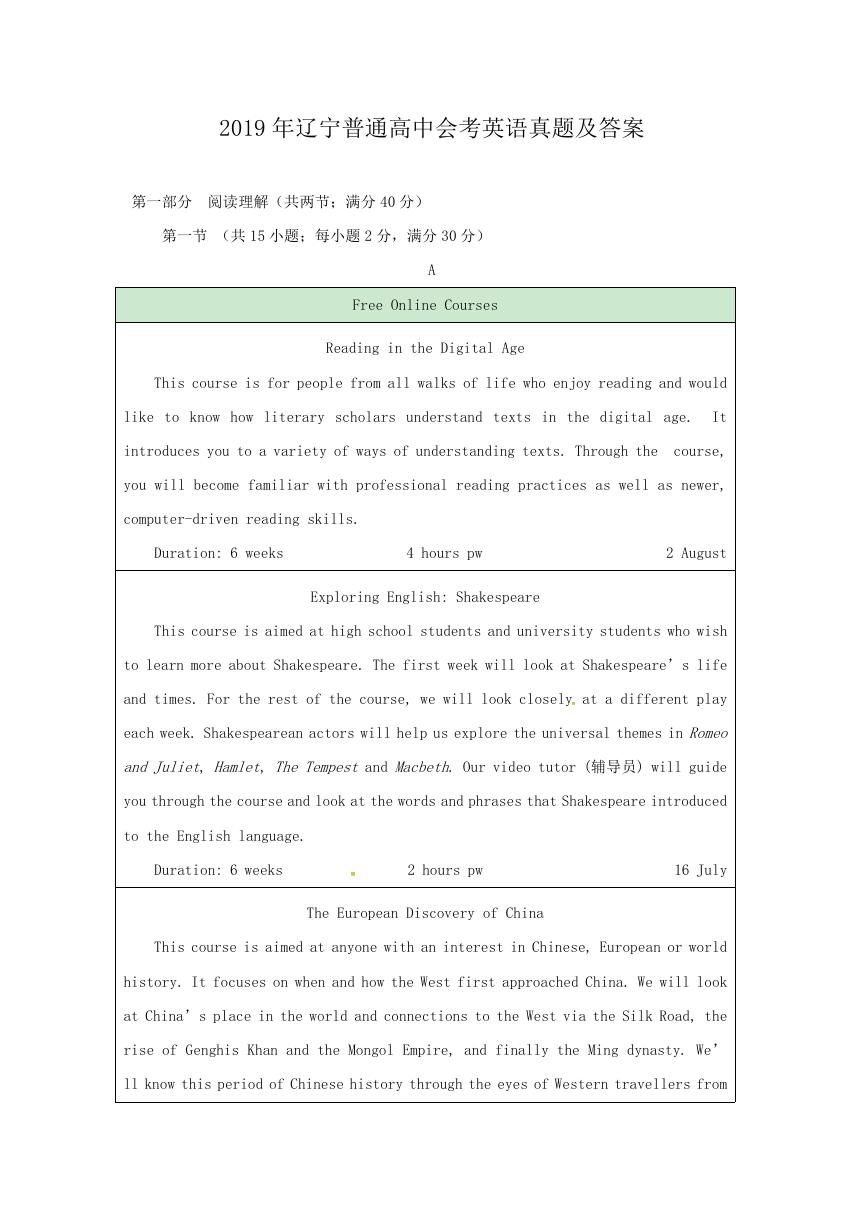
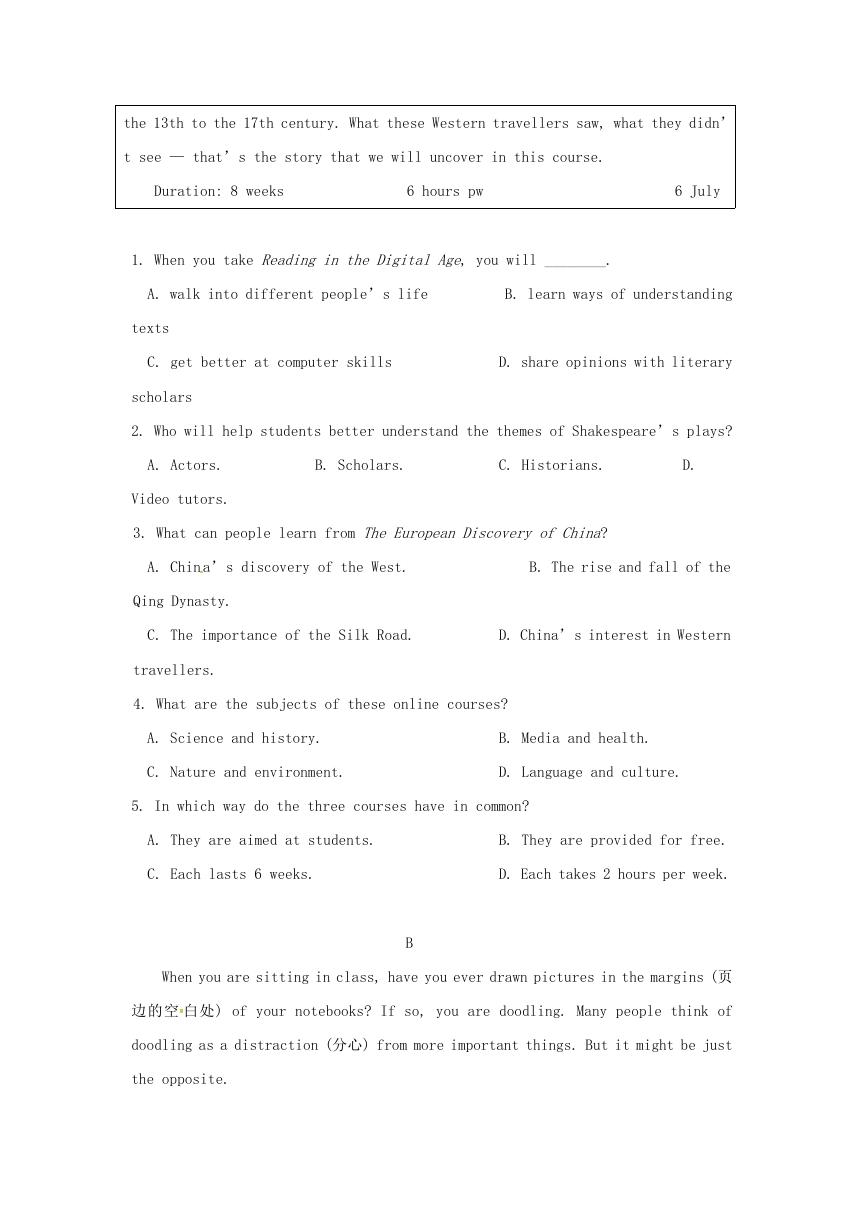
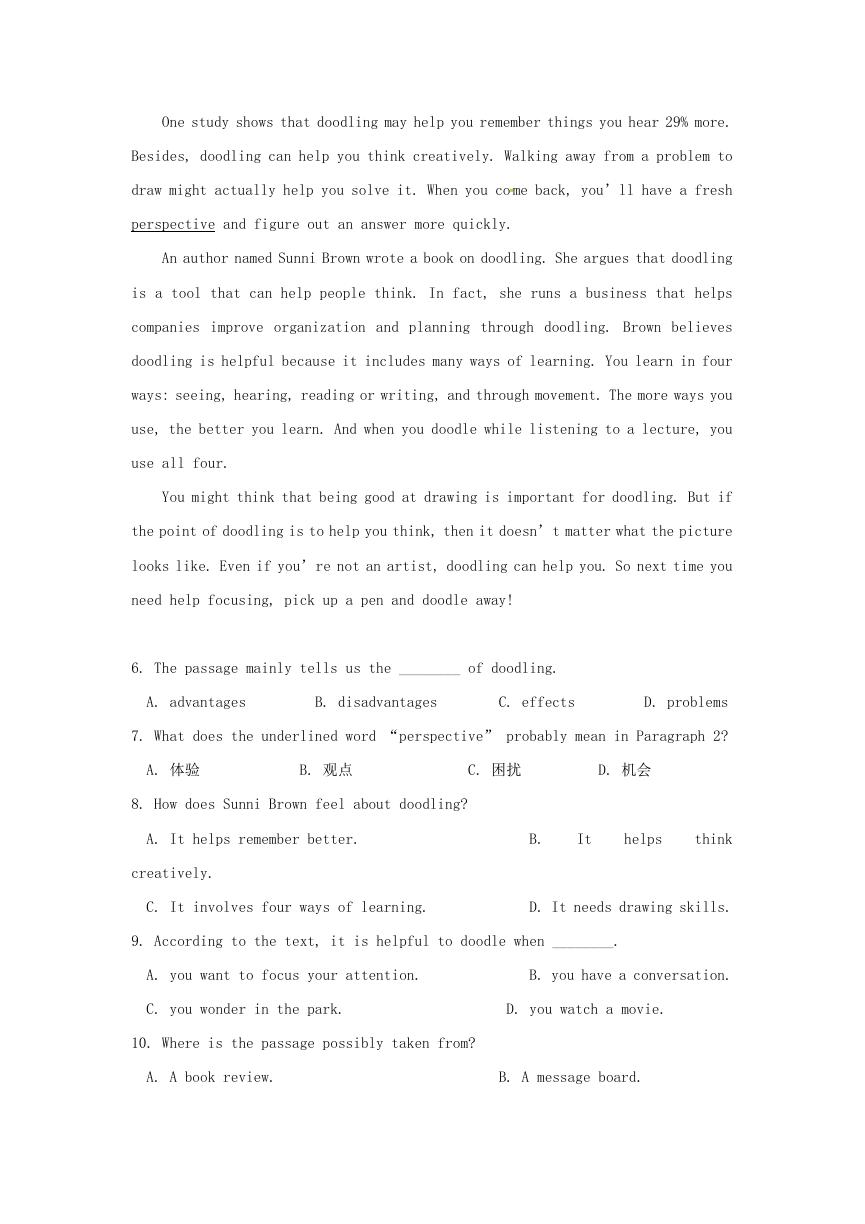


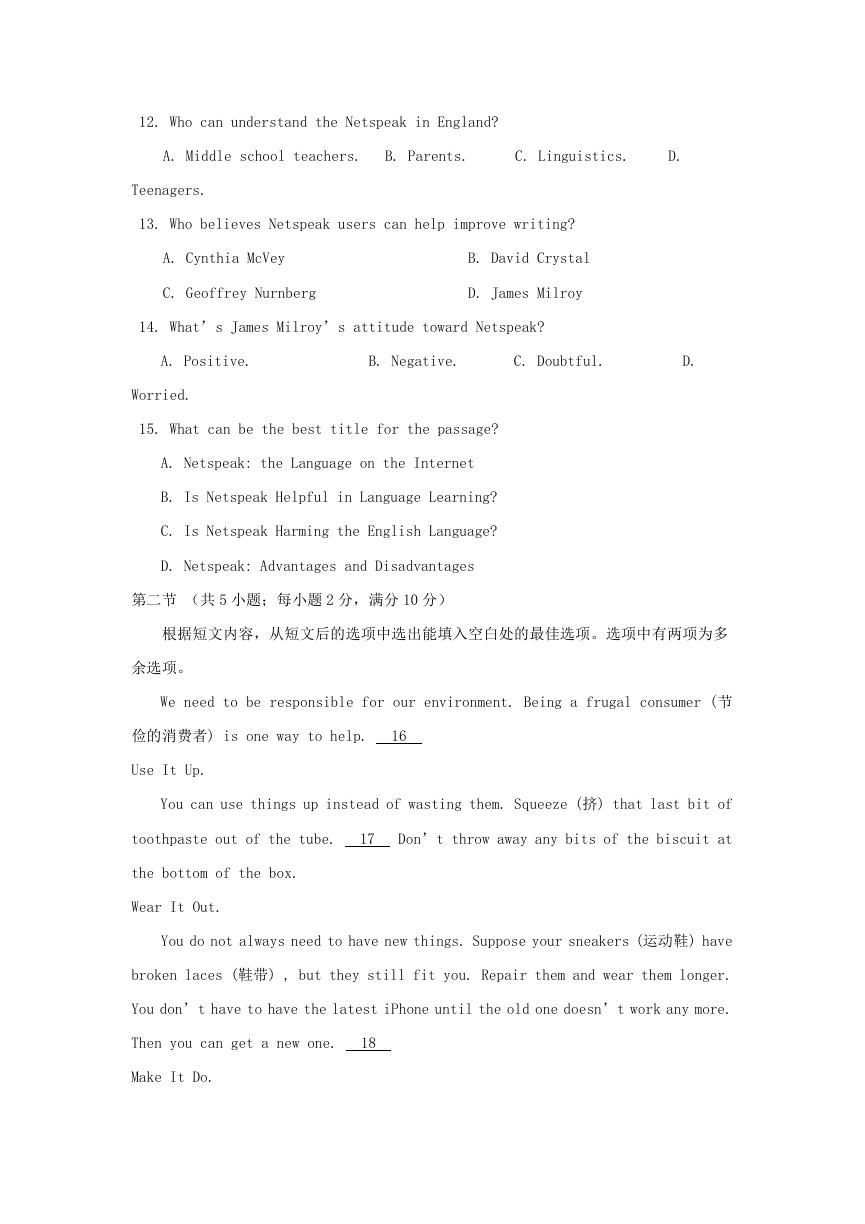
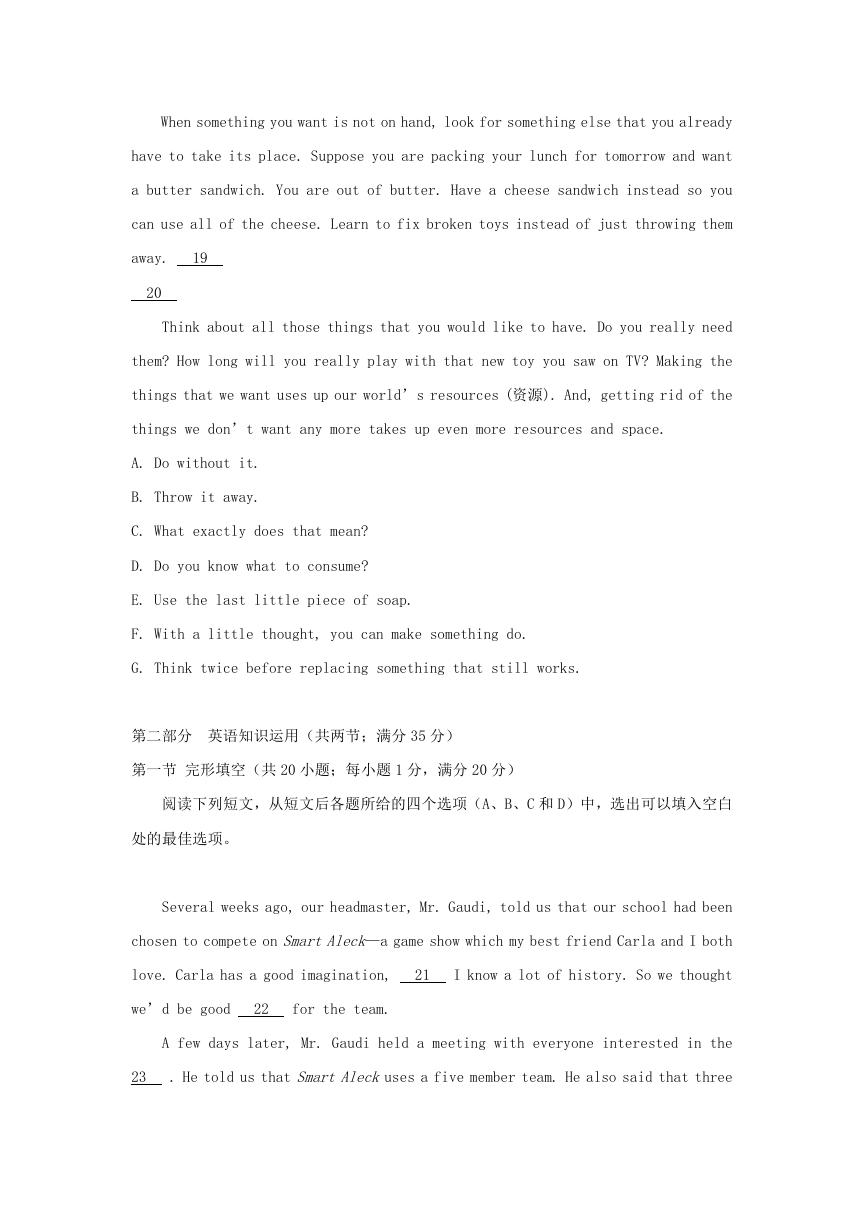
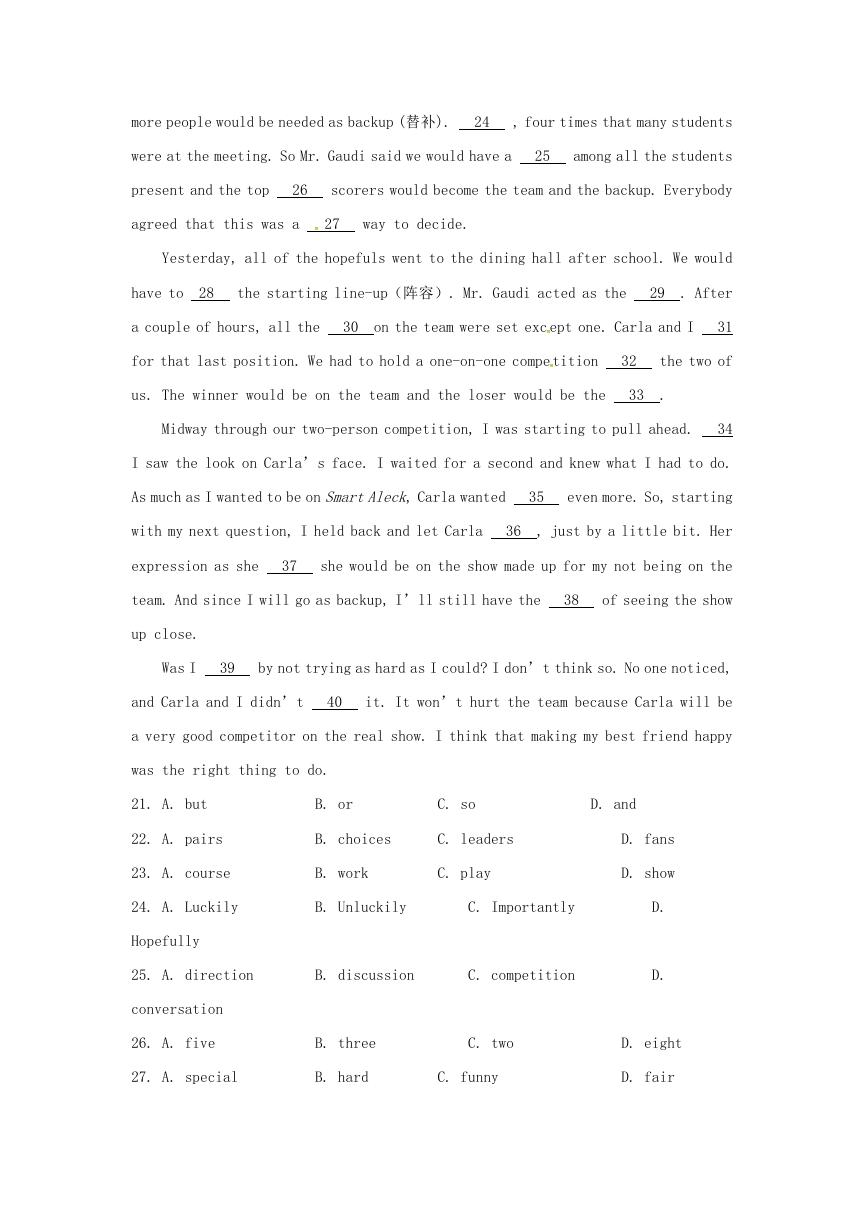








 2023年江西萍乡中考道德与法治真题及答案.doc
2023年江西萍乡中考道德与法治真题及答案.doc 2012年重庆南川中考生物真题及答案.doc
2012年重庆南川中考生物真题及答案.doc 2013年江西师范大学地理学综合及文艺理论基础考研真题.doc
2013年江西师范大学地理学综合及文艺理论基础考研真题.doc 2020年四川甘孜小升初语文真题及答案I卷.doc
2020年四川甘孜小升初语文真题及答案I卷.doc 2020年注册岩土工程师专业基础考试真题及答案.doc
2020年注册岩土工程师专业基础考试真题及答案.doc 2023-2024学年福建省厦门市九年级上学期数学月考试题及答案.doc
2023-2024学年福建省厦门市九年级上学期数学月考试题及答案.doc 2021-2022学年辽宁省沈阳市大东区九年级上学期语文期末试题及答案.doc
2021-2022学年辽宁省沈阳市大东区九年级上学期语文期末试题及答案.doc 2022-2023学年北京东城区初三第一学期物理期末试卷及答案.doc
2022-2023学年北京东城区初三第一学期物理期末试卷及答案.doc 2018上半年江西教师资格初中地理学科知识与教学能力真题及答案.doc
2018上半年江西教师资格初中地理学科知识与教学能力真题及答案.doc 2012年河北国家公务员申论考试真题及答案-省级.doc
2012年河北国家公务员申论考试真题及答案-省级.doc 2020-2021学年江苏省扬州市江都区邵樊片九年级上学期数学第一次质量检测试题及答案.doc
2020-2021学年江苏省扬州市江都区邵樊片九年级上学期数学第一次质量检测试题及答案.doc 2022下半年黑龙江教师资格证中学综合素质真题及答案.doc
2022下半年黑龙江教师资格证中学综合素质真题及答案.doc